My Experience Studying in Bali Posted by sasha on Jan 4, 2016 in Uncategorized
For the past four months, I’ve been living in Bali and studying Indonesian language and culture as part of the Darmasiswa program. Having just completed my first semester, I’d like to share some of my thoughts and experiences on the program.
An Intro to Darmasiswa
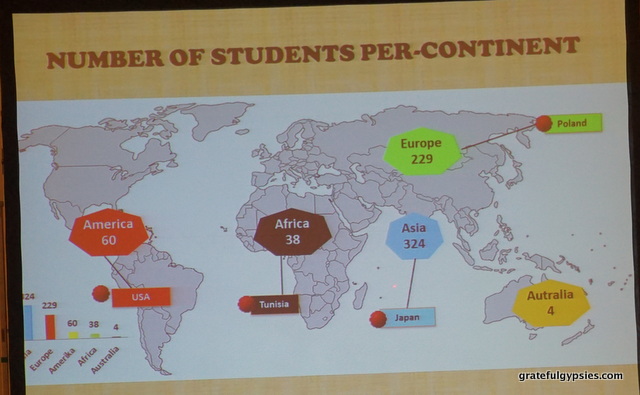
Map showing the participants for this year.
This program has been going on every year since 1974, and it is run by the Ministry of Education and Culture in cooperation with the Ministry of Foreign Affairs. There are 54 universities across the country – mostly in Sumatra, Java, and Bali – which are a part of the program. Most schools focus on Bahasa Indonesia, but there are quite a few that focus on the arts and culture – batik painting, puppetry, traditional dance and music. The program lasts for one school year, and it’s open to people from all countries that have diplomatic relations with Indonesia. For the 2015-2016 year, there are nearly 800 participants from over 80 countries. As a participant in Darmasiswa, you receive free tuition, a year-long visa, and a monthly stipend to offset some of the costs of living. You don’t receive a degree for the program – it’s simply meant for cultural exchange. For those with a genuine interest in the language and culture of Indonesia, this program is a great way to stay in the country for a while. Tourist visas only give you 30 days in country – not nearly enough to really dive in.
The Classes
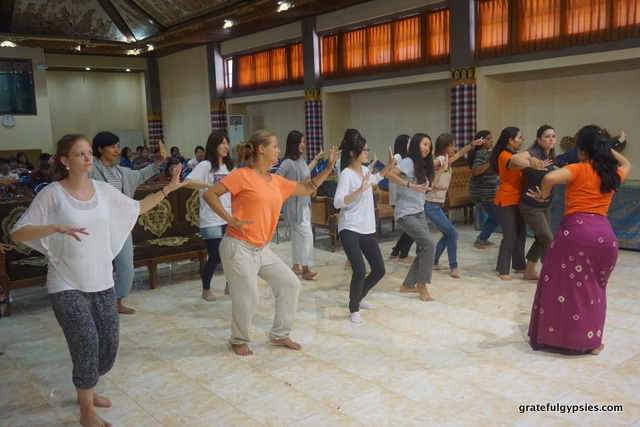
Learning how to dance at school.
Depending on which school you’re in, classes are 4-5 days a week, usually for half of the day. I study at Udayana University, and we have class Tuesday-Friday from 10:30-2 (I know, tough life, right?) Our program is focused on the language, but on Friday we have a Budaya (cultural) class, where we learn how to make traditional Balinese offerings, talk about holidays, or try in vain to figure out the Balinese calendar. One major complaint from participants is that the classes are a bit too relaxed – teachers show up late, there isn’t much structure, and you really aren’t pushed hard at all. Some enjoy this laid back approach, while others feel they’re not getting so much out of it. My thoughts are that you get what you pay for – the program is totally free, after all. Joining Darmasiswa gets you a visa for a year, which is a tough and expensive task in Indonesia. The classes will also provide a bit of a foundation for you, but to really get a lot out of it in an academic sense, you have to take the initiative on your own. For example, some friends of mine study at the arts school here and find their classes to be somewhat disappointing. As such, they have joined a gamelan (traditional Balinese music) group outside of school that meets 3-4 times a week. They pay extra in terms of time and money, but they get a lot out of it. Others are content with just showing up to class often enough to get the stipend and spending most of their time surfing and partying. It’s up to you what you make of it.
Life in Bali
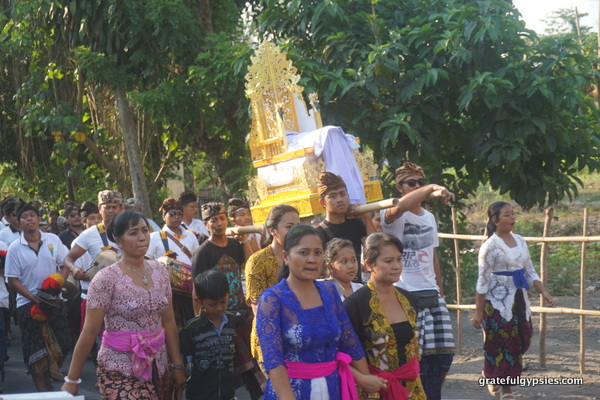
Ceremonies go on every day here.
Getting used to life in Bali has been quite easy for me, but that won’t be the case for everyone. Having already visited twice before and lived in Asia for the past 6 years, I was used to it and didn’t experience much culture shock. Also, I continue to earn an income by running this and other blogs, something which helps me immensely compared with people trying to live almost entirely off the stipend. At 2 million Rupiah (about $150) per month, it’s more than a lot of locals earn, but it’s tough to make it by on that for a foreigner. For one, we pay more for just about everything here. Also, if you’re coming all the way here to live for a school year, chances are you’ll want to do some traveling, surfing/scuba diving, and most likely a bit of partying. All of these things cost money, and they’re simply not possible given the stipend.
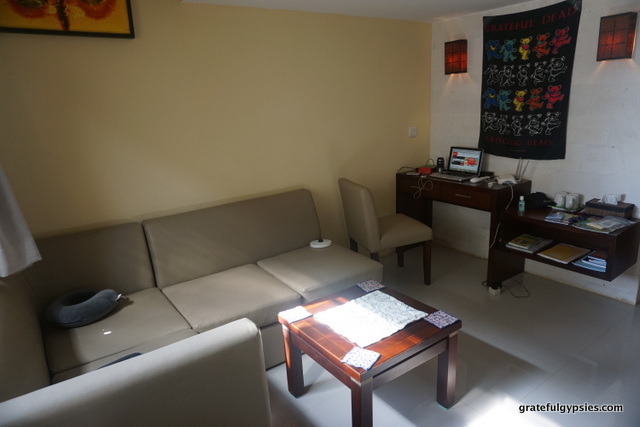
One of the places I’ve lived in so far.
One thing that has been a bit difficult for me is finding a stable place to live. As Bali caters primarily to tourists, there are tons of options for short-term accommodation, but when it comes to long-term most people want you to sign up and pay for a whole year or more up front. This simply wasn’t possible for me, as the program is only nine months long. As a result, I’ve bounced around a few different places already, paying month-to-month. This isn’t so bad, but it definitely makes it a bit tough to get settled in. Other than that, life has been pretty damn good here.
Final Thoughts
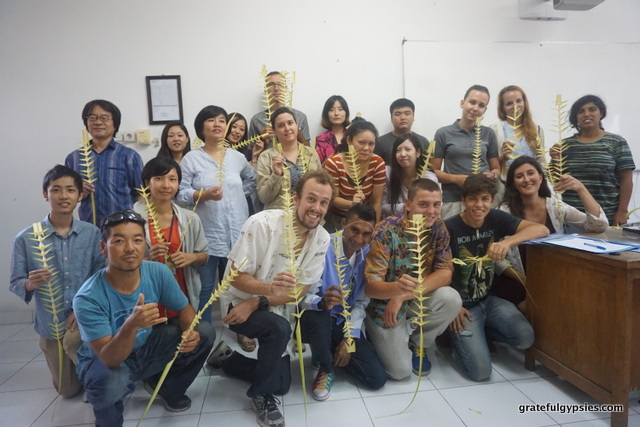
It’s been a good semester.
At first, I complained quite a bit about the program to my wife. As a language teacher myself, I couldn’t help but critique the classes and imagine how much better they could be. I’ve finally found a good balance here, though, and I’m quite happy with the way the first semester turned out. Basically, I make a concerted effort to go to at least half of the classes (with the better, more reliable teachers), I study on my own, and I dedicate time to writing the language blogs and working on my own website. On the weekends, I get out to explore the island – finding hidden beaches, checking out temples, or going to the many festivals that go on throughout the year here. If you’re in this program here, you’re getting a free visa, free tuition, and even getting paid. It’s kind of a dream come true, as I’ve loved Bali and wanted to stay longer ever since the first time I came here. Hopefully if you’re considering applying to the program for next year, this post has helped you a bit to understand what it’s like. Of course, the experience will be completely different for someone studying in Sumatra or Java, so I really can’t speak to that. If you’re genuinely interested in the language and culture of Indonesia (which you should be!), then this program is definitely worthwhile. You just may need to take the initiative yourself to really get what you want out of it.
If you have any questions about the program or life in Bali, please feel free to leave a comment below and I’ll get back to you.

Build vocabulary, practice pronunciation, and more with Transparent Language Online. Available anytime, anywhere, on any device.
About the Author: sasha
Sasha is an English teacher, writer, photographer, and videographer from the great state of Michigan. Upon graduating from Michigan State University, he moved to China and spent 5+ years living, working, studying, and traveling there. He also studied Indonesian Language & Culture in Bali for a year. He and his wife run the travel blog Grateful Gypsies, and they're currently trying the digital nomad lifestyle across Latin America.




Comments:
Mark:
Hello,
Thanks for the post,
I am going to bali in september, to study in ISI DENPASAR UNIVERSITY
I would like to ask some questions:
– where better to live? In Denpasar (which areas the safest)? Or kuta?
– how much rental fee for a studio flat? Or room in a shared flat? (Do you have some local website where to find advertisements for accomodation?
– living costs per month average? Considering going out once in the weekend, food, rent a studio or room, and maybe renting a scooter per months?
–
This is pretty much evtg as all other infos i found
sasha:
@Mark Hi Mark,
Congrats on heading to Bali to study! You’re going to love it. As far as where to live, it all depends on what you want. Denpasar is the city – it’s busy, there’s lots of traffic, etc. But there’s also lots of culture – museums, temples, parks, good restaurants. It’s very local as not many tourists go there. I would not live in Kuta if I were you. It’s the worst part of Bali if you ask me. If you want beach, try living in Sanur – it’s closer to ISI and a much quieter, nicer town in my opinion. There is such a wide range of places for rent. It’s all up to what you want. You pay more for things like A/C/, fast WiFi, a pool, etc. Join Facebook groups to look for places for rent. Same for living costs. I don’t know you – what you like to eat, drink, do, etc. You can live local and spend a few hundred bucks a month or spend a thousand or more if you go out quite a bit. You’ll figure it out when you get there 😉
Mark:
Thanks!
You can also answer to
Dioniso1981@gmail.com